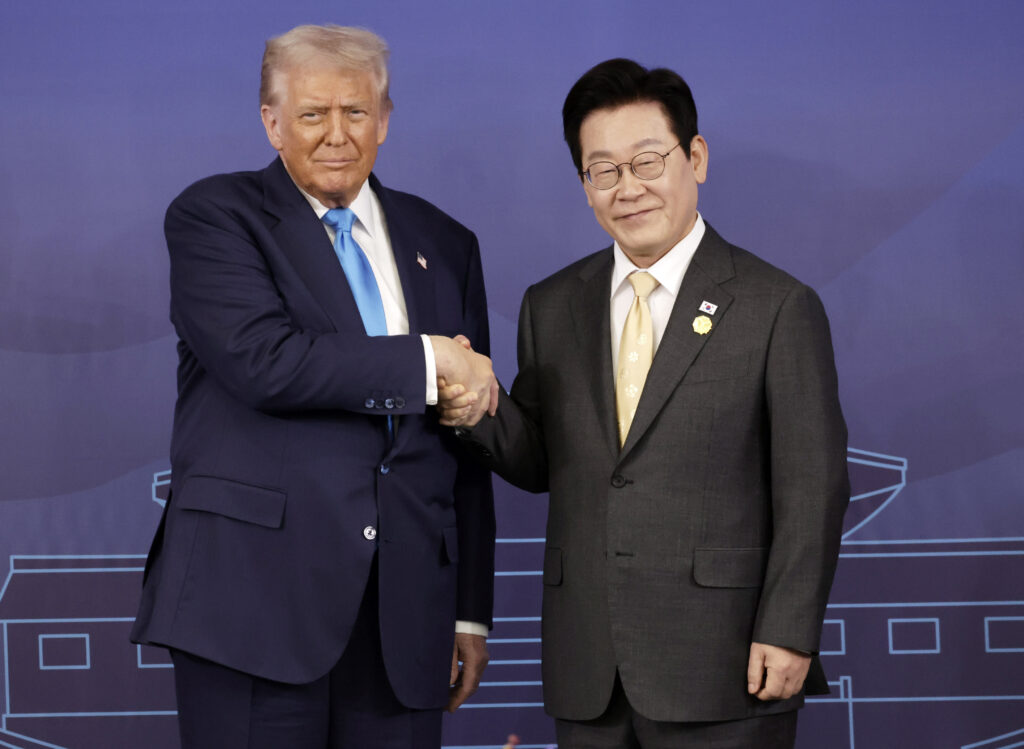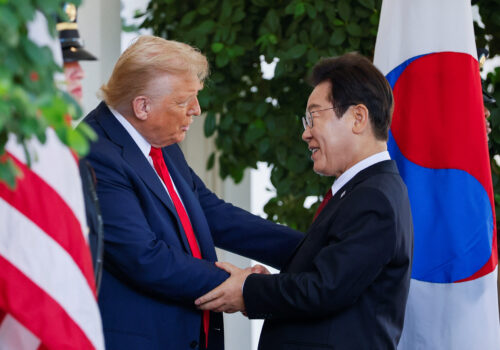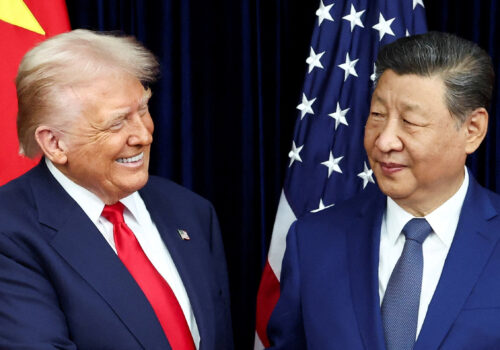On October 31 and November 1, South Korean President Lee Jae-myung hosted the Asia-Pacific Economic Cooperation (APEC) Leaders’ Summit in Gyeongju. The summit proved to be a pivotal moment for South Korea’s evolving foreign economic and defense strategy, showcasing Lee’s pragmatic foreign policy agenda—aligning trade policy with technological statecraft—as Seoul balanced strategic relations with both Washington and Beijing. Throughout the summit, South Korea strategically leveraged its diplomatic influence to strengthen Seoul’s standing within the multilateral economic framework, secure trade deals with the United States, and initiate public–private partnerships across critical and emerging technology sectors.
Multilateral diplomacy, bilateral balancing
South Korea has played a special role in APEC’s history, from its establishment and expansion of diplomatic membership to the modernization of the forum’s economic agenda. South Korea last hosted the APEC summit in 2005 in Busan, where it championed the reduction of regional tariffs as a means of enhancing Indo-Pacific economic prosperity.
Twenty years later, however, the geopolitical system is marked by rising economic competition under an increasingly fractured global trade regime. To address these challenges, this year’s APEC meetings—under the banner of “Building a Sustainable Tomorrow: Connectivity, Innovation and Prosperity”—emphasized the necessity of regional cooperation, shared trade benefits, reinforced supply chain resiliency, and expanded regional science and technology innovation. Despite concerns over US-China economic competition, South Korea successfully convened twenty-one nations from across the Indo-Pacific region.
This year’s proceedings also included the first-ever APEC CEO Summit on October 29-31, which focused on expanding industry-to-industry relations. Gathering more than 1,700 business executives from around the world, the CEO Summit aimed to broaden APEC’s public-private partnerships across critical industries including on energy, digital and artificial intelligence (AI) transformation, trade, and biotechnology. Additionally, this year’s multilateral discussions concluded with the 2025 APEC Leaders’ Gyeongju Declaration, highlighting consensus on economic and technology cooperation and a shared “determination to build a region of peace and prosperity” in the Indo-Pacific.
Amid the rush of APEC meetings, South Korea also hosted a series of successful bilateral summits with world leaders, including US President Donald Trump for his second meeting with Lee, Chinese President Xi Jinping for his first visit to South Korea in eleven years, and recently elected Japanese Prime Minister Takaichi Sanae.
An emphasis on AI innovation
Building on August’s APEC Digital and AI Ministerial Statement, South Korea spearheaded international consensus-building for AI regulation and innovation at the summit. This culminated in the summit’s participants making cross-regional commitments laid out in the APEC Artificial Intelligence Initiative (2026-2030).
South Korea’s emphasis on science and technology innovation comes at a time when advances in AI are redefining traditional pillars of global economic cooperation and competition. Following the United States’ and China’s lead, South Korea has announced its own agenda for building a “sovereign AI” system and played an increasingly visible role as a convener of international fora on AI innovation and deployment.
As a core pillar of Lee’s economic policy, South Korea has also launched new comprehensive support programs, targeting leading South Korean companies to advance industrial capacity-building and develop the domestic workforce needed to drive AI innovation. On the international stage, South Korea has emphasized the balancing of risk versus reward for AI innovation through multilateral platforms such as the Summit for Democracy in March 2024, the AI Seoul Summit in May 2024, and Responsible AI in the Military Domain (REAIM) Summit in September 2024.
However, despite global interest in AI development policy, the landscape for geopolitical cooperation on AI norms and regulations remains nascent. But the APEC AI Initiative marks the first documented agreement endorsed by both the United States and China—further demonstrating South Korea’s role in middle-power science and technology diplomacy.
US-South Korea trade deal and rising technology cooperation
Ahead of the APEC Leaders’ Summit, Trump and Lee met for the second time after months of tariff negotiations. During the first Trump-Lee Summit last August, Washington and Seoul failed to reach an official agreement to reduce US tariffs due to the fact that South Korea’s proposed $350 billion investment package remained relatively nebulous.
On October 29, however, following Trump and Lee’s meeting, South Korea announced the successful conclusion of an official US-South Korea trade deal. The deal reduced US “reciprocal tariffs” on the South Korean auto industry from 25 percent to 15 percent over the coming months. Based on the agreement, South Korea will invest $350 billion in critical US industries and markets—marking a stark increase from the $140 billion in promised foreign direct investment commitments the United States secured under the Biden administration. While $150 billion will go toward expanding US-South Korea cooperation on shipbuilding, Seoul has stated that the remaining $200 billion will be direct cash investments, capped at $20 billion annually, for future initiatives.
Additionally, the US-South Korea trade deal came amid a flurry of productive, industry-level memorandums of understanding (MOUs) on expanded technology cooperation signed between the two countries. Most notably, Nvidia CEO Jensen Huang pledged to provide more than 260,000 graphics processing units to Korean companies including Samsung Electronics, Hyundai Motor Group, and SK Group in support of South Korea’s domestic AI development.
Additionally, under the newly declared US-ROK Technology Prosperity Deal, both Washington and Seoul aim to expand cooperation on innovation for AI technology development and deployment. Under this deal, the two nations reasserted their commitments to “elevate the U.S.-ROK Alliance” through close collaboration on “developing pro-innovation AI policy frameworks.” Neither the APEC AI Initiative nor the US-South Korea AI-centered technology deal, however, broach the subject of AI regulations outright—unlike previous multilateral agreements such as the European Union’s AI Act or previous Group of Seven (G7) declarations on “safe, secure, and trustworthy” AI innovation.
Instead, the APEC AI Initiative aims to harness the “transformative potential of AI,” while “acknowledging member economies’ different approaches to their respective AI policies.” Moreover, the US-South Korea technology deal marks a bilateral restructuring of their shared AI development agenda, which is now focused mainly on pro-innovation policies in alignment with Trump’s domestic AI agenda.
The road ahead
South Korea’s hosting of the APEC Summit demonstrated successful leadership as a global convener, advancing US allies’ and partners’ engagement in the Indo-Pacific region and beyond.
By leveraging the forum’s multilateral platform, Seoul secured critical trade and technology outcomes, including expanded semiconductor supply chain partnerships, multilateral and bilateral frameworks on AI innovation, and joint initiatives to accelerate low-carbon energy initiatives and digital innovation. These outcomes reinforced South Korea’s strategic positioning as a pragmatic leader in shaping global technology norms and advancing economic resilience across the Indo-Pacific region.
Following the summit, however, the harder task will be to ensure successful implementation of the US-South Korea trade and technology deals. The two countries’ deepening cooperation on critical and emerging technologies offers an opportunity for them to strategically calibrate shared science and technology policy, which should be anchored in a mutually beneficial commitment to secure, transparent, and sustainable innovation ecosystems. As Washington and Seoul seek to integrate science and technology diplomacy into their broader economic security agendas, the durability of these frameworks will depend on the continued alignment of their policy priorities, public-private partnerships, and institutional cooperation.
Looking toward the future of US-South Korea relations, the outcomes from this year’s APEC summit signal a constructive trajectory for bilateral strategic science and technology engagement—one that aims to enhance strategic competitiveness in an increasingly complex geoeconomic and technological landscape.
Kayla T. Orta is a nonresident fellow in the Indo-Pacific Security Initiative at the Atlantic Council’s Scowcroft Center for Strategy and Security.
Further reading
Tue, Sep 9, 2025
Focus on dual deterrence, not headcount, for transforming US Forces Korea
New Atlanticist By Markus Garlauskas
In Washington, a narrow focus on the number of US troops in South Korea has obscured a more important discussion on the broader capabilities needed going forward.
Tue, Aug 26, 2025
Five questions (and expert answers) about where the US-South Korea alliance goes from here
New Atlanticist By
The US and South Korean presidents met on Monday in Washington to discuss a range of bilateral issues, from security to shipbuilding.
Thu, Oct 30, 2025
Experts react: What does the Trump-Xi meeting mean for trade, technology, security, and beyond?
New Atlanticist By
The US and Chinese presidents met on Thursday to discuss issues ranging from tariffs to TikTok. Atlantic Council experts break down what came out of the tête-à-tête.
Image: October 29, 2025, Gyeongju, Gyeongbuk, SOUTH KOREA: Oct 29, 2025, Gyeongju, South Korea-South Korean President Lee Jae Myung (R) and US President Donald Trump (L) shake hands ahead of their talks at the National Museum in Gyeongju, North Gyeongsang Province, southeastern South Korea, 29 October 2025. Credit Image: © Apec2025korea via ZUMA Press Wire.




